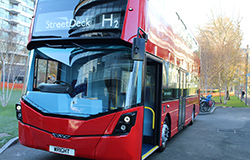Foot on the accelerator for drive to reduce public transport emissions
The joint procurement activity is part of the JIVE (Joint Initiative for hydrogen Vehicles across Europe) project, an EU-funded project aiming to deploy 139 new zero emission fuel cell buses across nine cities, the first deployment of this scale in Europe. Despite being only a few months old, the placing of 63 new buses means that the project’s aim of more than doubling the number of zero emissions buses operating in Europe is well underway. Ben Madden, Director of Element Energy, the project coordinator in the UK, has explained that taking a coordinated approach to purchasing large numbers of these buses facilitates the delivery of increased standardisation and significant cost reductions, allowing the cities to realise their ambitious zero emission bus adoption plans. The project was set up to deploy around 140 of these new buses across nine locations, in five European countries; the first deployment of this scale in Europe. The road to full commercialisation In the quest to reduce local public transport emissions, hydrogen fuel cell buses have already demonstrated their effectiveness in a number of projects across Europe as outlined by the, Fuel Cells and Hydrogen Joint Undertaking, public private partnership. However, there remain significant barriers to full commercialisation. Chief amongst these are that, compared to conventional buses, FC buses have higher ownership costs. There is also the market barrier most new technologies face: the need to meet public demand through assured availability and reliability. Finally the refuelling infrastructure has to be comprehensively established. JIVE anticipates that coordinated procurement, whereby multiple cities and regions can launch joint processes, will allow large orders to be placed with individual bus suppliers, thus accruing economies of scale. Additionally, this clustering approach makes it possible for bus orders to share common technical specifications. The fleets are also planned to be larger than previously deployed, with 10-30 buses, with attention also placed on establishing efficient supply chains and maintenance operations. The project is also testing new hydrogen refuelling stations capable of serving fleets of more than 20 buses. This will both reduce the cost of hydrogen, as well as test the system’s capacity to offer reliability at the required commercialisation level – greater than 99%. Realising the benefits of hydrogen fuel cells It has been estimated by an Intergovernmental Panel on Climate Change report that transportation is responsible for over a quarter of global CO2 emissions and is one of the fastest growing contributors to greenhouse gases. The introduction of Low Emission Vehicles (LEVs) as alternatives to fossil fuel vehicles, has been deemed essential to mitigate this. Hydrogen fuel cells are considered a clean fuel source as the combination of hydrogen gas (H2) and oxygen gas (O2) results in the production of water, electricity, and heat, as opposed to the generation of the harmful by-products caused by the burning of fossil fuels, within internal combustion engines. Through its large-scale deployment, JIVE’s overall objective is to make it commercially viable for bus operators to include hydrogen fuel cell buses in their fleets, without the need for subsidies. By doing so JIVE offers local and national governments a viable option to meet targets for emissions reductions. Furthermore, success with fuel cell buses could have the knock on effect of encouraging the use of hydrogen for other vehicles, such as passenger cars or commercial trucks and vans. It was even announced recently that the world’s first hydrogen fuel cell train will start running in Germany next year. For more information, please see: CORDIS project webpage
Countries
United Kingdom



